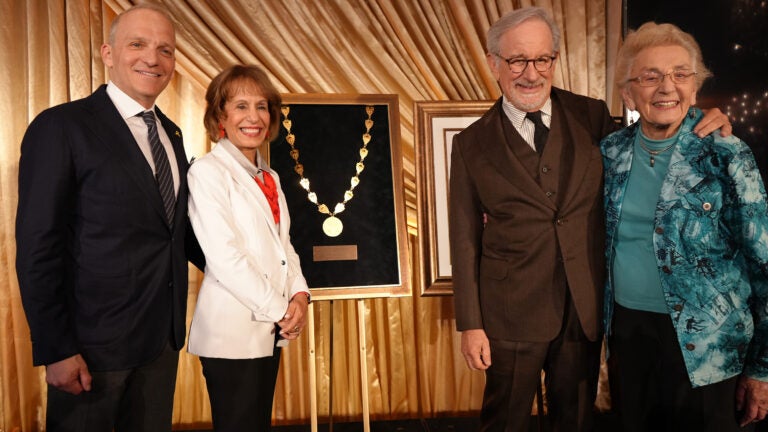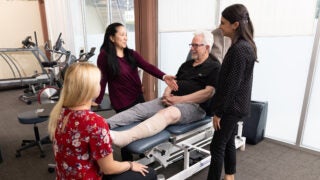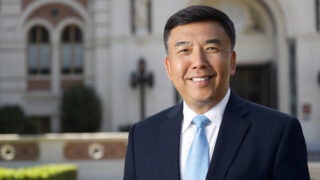
Joel Citron, chair of the USC Shoah Foundation Board of Councilors; USC President Carol Folt; USC Life Trustee Steven Spielberg; and Holocaust survivor Celina Biniaz (from left) attend the presentation of the University Medallion to the survivors who have shared their stories with the foundation. (USC Photo/Sydney Livingston)
University Medallion recognizes Holocaust survivors who entrusted testimonies to USC Shoah Foundation
USC Life Trustee Steven Spielberg created the foundation three decades ago to preserve the stories of genocide survivors.
For nearly five decades, Celina Biniaz didn’t speak about her experiences during the Holocaust — even with her children. As a girl, Biniaz survived the Krakow Ghetto, the Plaszow concentration camp and the Auschwitz-Birkenau death camp before she and her family were saved by German businessman Oskar Schindler when Biniaz was 13.
But after seeing Steven Spielberg’s 1993 film Schindler’s List — which tells the story of how Schindler rescued more than 1,000 Jews from death in concentration camps — Biniaz was inspired to come forward to share her eyewitness account of the Holocaust and experiences as one of the youngest people on that list.
This week, 92-year-old Biniaz linked arms with Spielberg to accept USC’s highest honor, the University Medallion, from USC President Carol Folt on behalf of all the survivors whose testimonies have been preserved by USC Shoah Foundation — The Institute for Visual History and Education, which Spielberg established in 1994.
“I believe the human voice speaks louder than history books,” Biniaz said. “We must always remember the power each individual has to transform the lives of others.”
About 265 faculty, university leaders and supporters of USC Shoah Foundation — including more than 30 Holocaust survivors and their families — gathered on Monday at Town and Gown on the University Park Campus for the historic ceremony.
The intergenerational event was at turns joyous and pensive as survivors, Shoah Foundation staff and volunteers reflected on 30 years of the foundation’s accomplishments. USC students embraced survivors and posed for cellphone photos with Spielberg, a life trustee of USC. Leslie Goldberg, a cantorial student at Hebrew Union College — Jewish Institute of Religion, performed “Ani Ma’amin,” a soaring Hebrew hymn that translates to “I Believe.” One survivor wiped tears from her eyes as another survivor related his story.
“Your testimonies are an irreplaceable record of a dark time in history that the world must never forget,” Folt said, addressing the survivors present at the event and alluding to the Nazi atrocities that killed millions of Jews. “One survivor told me, ‘It’s my duty to speak for 6 million.’ And I say, ‘It’s our duty to ensure your voices are heard by 6 billion.’”
Given only three other times in the university’s history, the gold University Medallion is bestowed upon those who have made a major contribution to society and USC. The previous recipients include Walter Annenberg (1994), Dana and David Dornsife (2011) and Wallis Annenberg (2017).
One survivor told me, ‘It’s my duty to speak for 6 million.’ And I say, ‘It’s our duty to ensure your voices are heard by 6 billion.’
USC President Carol Folt
“The University Medallion is a symbol of USC’s lasting commitment to use these visual and oral histories to educate, enlighten and shape a future without hate,” Folt said.
Using stories as a tool of tolerance
The granting of the University Medallion comes at a time when antisemitism is on the rise globally in the wake of the Oct. 7 attack on Israel by Hamas and the subsequent war in Gaza.
“I am increasingly alarmed that we may be condemned to repeat history — to once again have to fight for the very right to be Jewish,” Spielberg said. “In the face of brutality and persecution, we have always been a resilient and compassionate people who understand the power of empathy to combat fear.
“We can rage against the heinous acts committed by the terrorists of Oct. 7 and also decry the killing of innocent women and children in Gaza,” Spielberg added. “This makes us a unique force for good in the world and is why we are here today to celebrate the work of the Shoah Foundation, which is more crucial now than it was in 1994.”
Spielberg, who is Jewish and lost family in the Holocaust, spoke about his own experiences as a target of antisemitism, recounting how he was physically and verbally harassed as one of the only Jewish students in his high school in California. He shared that he was inspired to create the foundation when filming Schindler’s List in Krakow, Poland, after a group of Holocaust survivors visited the set. To date, the institute has recorded more than 56,000 survivor testimonies from 65 countries and in 44 languages.
Spielberg entrusted USC with the stewardship of the foundation and its audiovisual archive in 2006. Since then, USC has invested $50 million in the foundation, providing the necessary infrastructure to ensure the permanence of the collection and its use for education and research purposes.
“It is USC’s mission to preserve and protect these eyewitness accounts in perpetuity,” Folt said. “Awarding the University Medallion is one way that we do it. It will forever be a public display of our commitment to ensuring the testimonies from the survivors will be preserved for generations to come. And it honors individuals whose testimonies are preserved in the Shoah Foundation for bringing light in times of darkness.”
While countering antisemitism lies at the core of USC Shoah Foundation’s mission, Spielberg emphasized that the foundation endeavors to inoculate the world from hatred in all its forms. The foundation’s visual history archive contains testimonies from survivors of other mass-atrocity crimes and genocides, including the Armenian genocide, the genocide against the Tutsi in Rwanda and the killing and expulsion of Rohingya Muslims from Myanmar.
Shaping tomorrow’s leaders
USC Shoah Foundation’s visual history archive serves as an educational tool for middle and high school students and those enrolled at USC. Last summer, the foundation sponsored the first Stronger Than Hate Leadership Summit, which sent a group of USC student-athletes to Europe to tour the Auschwitz-Birkenau concentration camp and experience Jewish culture in Poland.
One of the survivors who participated in the summit was Shaul Ladany, who joined Monday’s medallion ceremony at USC virtually via Zoom from his home in Israel. The 88-year-old Olympic athlete and world-record holding speed-walker, who gave his testimony to USC Shoah Foundation in 2023, is a survivor of both the Bergen-Belsen concentration camp and the massacre of Israeli athletes at the 1972 Munich Olympics.
Ladany spoke to those at the medallion ceremony about how he was able to survive the Holocaust, emigrate to Israel and become a professional athlete and academic. Afterward, USC fourth-year track and field athlete Rae-Anne Serville, who first met Ladany as part of the Stronger Than Hate summit group, had a poignant question for him.
“How did you find the strength to go through all [your] experiences while still having such a positive outlook?” Serville asked.
“I was born as an optimist,” Ladany replied.
Serville also spoke about the profound impact the trip had on her. Seeing the gas chambers where Jews perished and adjacent towns where Jews’ suffering was ignored drove home the role that bystanders can play in genocide.
“The main takeaway for me is that indifference is just as dangerous as being a perpetrator of hate,” Serville said. “Being indifferent allows hate to continue.”
Visualizing the future
Sponsoring educational trips such as the leadership summit is one way USC Shoah Foundation is evolving.
Robert Williams, the Finci-Viterbi Executive Director of USC Shoah Foundation, noted that while the foundation is rooted in the model of survivor documentation established by Spielberg 30 years ago, the day when no living Holocaust survivors remain is drawing close.
“Today, we live in a world where there are less than 245,000 Holocaust survivors still with us to share their stories,” Williams said. “And at an average age of 86, I’m sorry to say, the sun is soon setting.”
The foundation is now working to build a collection on antisemitic violence after 1945 that will be used for scholarly pursuits and investigative journalism. It recently launched an initiative to add 10,000 testimonies to its Contemporary Antisemitism collection and has plans for a Countering Antisemitism Laboratory, a multidisciplinary research center. In partnership with schools across USC, the foundation will leverage pioneering technology to tackle online antisemitism.
Today, we live in a world where there are less than 245,000 Holocaust survivors still with us to share their stories. And at an average age of 86, I’m sorry to say, the sun is soon setting.
USC Shoah Foundation Executive Director Robert Williams
“The fact that we are doing this at a world-class research university, with campuses here in Los Angeles and in Washington, D.C., means that we can reach the leaders of tomorrow while engaging with the leaders of today,” Williams said.
As the event concluded, Folt gathered survivors, USC Shoah Foundation staff and the day’s speakers to pose for a group photo on the staircase at the west end of the banquet room. Smiles abounded as each person found their place within the frame and bumped elbows with those standing next to them, demonstrating the web of connections USC Shoah Foundation has fostered during its three decades.
That spirit of connectedness remained even after the room had nearly emptied. Several USC student journalists and survivors lingered, locked in conversation as the survivors shared their stories. As Spielberg had said during his talk, stories are the foundation of history — and they can be unforgettable.









